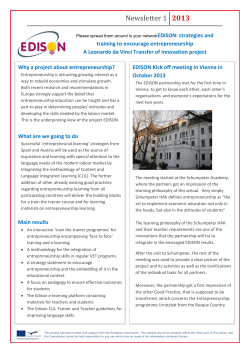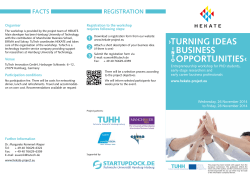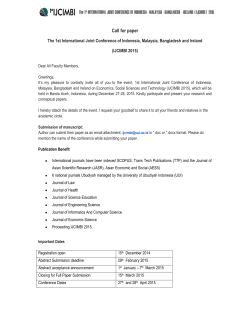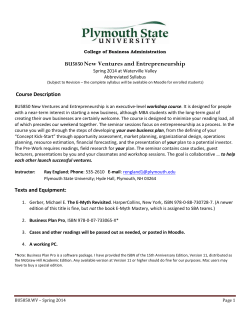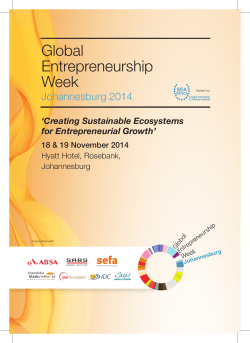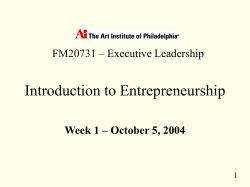
Seminar 1 â Innovation Walter Leal
"Promoting innovation and entrepreneurship in the North Sea Region and our knowledge base” Prof. Dr. Dr. h.c. Walter Leal Head of the Research and Transfer Centre „Applications of Life Sciences“ Hamburg University of Applied Sciences Fakultät Life Sciences /Faculty of Life Sciences Lohbruegger Kirchstraße 65 21033 Hamburg Germany Tel.: +49-40-42875-6313 Mobil: +49-172-7835489 Fax : +49-40-42875-6079 e-mail: walter.leal@ls.haw-hamburg.de Outline Defining innovation and entrepreneurship Strenghtening the knowledge basis Innovation and entrepreneurship in the North Sea projects Some problems Conclusions: some challenges ahead Mind-setting: 2000) Making Europe a more attractive place to invest and work (Lisbon A new emphasis to protect the environment and achieve a more sustainable pattern of development (Gothenburg 2001) Defining innovation and entrepreneurship Innovation is a dynamic process which involves generating and applying knowledge It relates to new processes, new approaches, new methods or new ways of thinking and depends on the available knowledge base Entrepreneurship is the process which a) leads to new enterprises or b) an enterprise thinking. This often involves risks. The entrepreneur is the person prepared to take risks and create new ventures. Strenghtening the knowledge basis Knowledge is needed to achieve further progress and keep competitiveness A knowledge basis involves knowledge of infrastructure, of the regime of a political economy, of the innovative dynamics and inputs from various actors (e.g. universities, industries, and governments) plus their active interactions Successful regions (e.g. Paris, London, Öresund), have a sound knowledge basis and active interactions catalysed by the relevant players organising an active feed-back loop The intensity and the quality of the interactions is decisive for a sound knowledge basis and may lead to tangible results. Schematic view of a knowldege basis Strenghtening the knowledge basis Knowledge is needed to achieve further progress and keep competitiveness A knowledge basis involves knowledge of infrastructure, of the regime of a political economy, of the innovative dynamics and inputs from various actors (e.g. universities, industries, and governments) plus their active interactions Successful regions (e.g. Paris, London, Öresund), have a sound knowledge basis and active interactions catalysed by the relevant players organising an active feed-back loop The intensity and the quality of the interactions is decisive for a sound knowledge basis and may lead to tangible results Innovation and entrepreneurship in North Sea projects Some degree of innovation and entrepreneurship is expected from projects: innovative ideas enhance the basis for individual actions and strenghten Interreg Emphasis to entrepreneurship is welcome: we should be able to see an opportunity and exploit it; we should know when to stop when something is not working or how to get the best from people/organisations Job creation and/or upkeeping of existing jobs are examples of useful milestones In order to be competitive, the North Sea region needs a „culture of innovation“ and a „feeling for entrepreneurship“: projects should promote innovation and innovativeness. Some problems Innovation is a dynamic but a demanding process (no easy fixes) A sound knowledge basis needs new approaches, new methods or new ways of thinking which requires investment in the medium and long-term Enterprise-thinking needs to be sound, reasonable and realistic Many people are not prepared to take risks and create new ventures. Conclusions: some challenges ahead Encouraging people (and projects!) to push the edge of innovation is worthy pursuing Projects need to demonstrate a sound knowledge basis and commitments from the players to further this basis (not business as usual!) Qualitative elements as opposed to quantitative ones need to be considered more seriously (a project with 4 partners is not necessarily worse than a project with 8 partners) Innovation and entrepreneurship need to be seen as real tools to achieve tangible outputs. The North Sea Region offers a wide knowledge basis and a fertile ground for innovation and entrepreneurship. THANK YOU FOR YOUR ATTENTION! Prof. Dr. Dr. h.c. Walter Leal Head of the Research and Transfer Centre „Applications of Life Sciences“ Hamburg University of Applied Sciences Fakultät Life Sciences /Faculty of Life Sciences Lohbruegger Kirchstraße 65 21033 Hamburg Germany Tel.: +49-40-42875-6313 Mobil: +49-172-7835489 Fax : +49-40-42875-6079 e-mail: walter.leal@ls.haw-hamburg.de
© Copyright 2025





